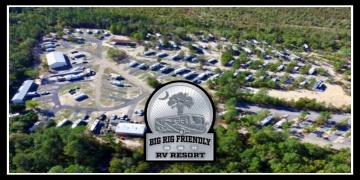Name of Blog
RV Tips Blog
Camping Tips Blog

7 Questions to Ask Your RV Dealer
02-06-2019If you are buying a new or used RV, you are bound to have questions for the RV dealer. Buying an RV combines all the stress that comes with buying a car and a home. So it makes sense that shopping for an RV can be an intimidating experience. You can’t just base your decision on finding the lowest price, shiniest model or the most high-tech gadgets. You need to find the right fit that’s going to meet your camping needs and your budget.
Your RV is bound to be a big investment, so it’s important to take the time to prepare before you hit the dealership. Thankfully, we’ve got you covered. Here’s our guide on how to navigate your time at the dealership to get the best RV for you.
1. What will fit my camping style?
The first and most important question to ask is “what RV will fit my camping style?” Before you even set foot in the dealership, you need to have a firm grasp on what you’ll be using your RV for. Are you planning on hitting those famous national parks? Many of them have size restrictions. Do you want to take your RV boondocking? You might want to forget that luxurious mansion on wheels.
Let your dealer know how you intend to use your RV. You’ve probably already made your decision on whether you want to buy a class A or class C motorhome, but the dealer can help you find the right size, make and model for your needs.
2. What’s the MSRP?
We all know the stereotype of the greedy car salesman. This image is so ingrained in our culture that many of us avoid the car dealership in the first place.
How can you make sure you get a fair deal? Ask to see the MSRP sheet. MSRP stands for Manufacturers Suggested Retail Price. It’s basically the factory window sticker that indicates the recommended price set by the manufacturer. Do your research and cross reference the MSRP at several dealership before settling on a price. One tip to remember: don’t be afraid to negotiate. It’s always worth asking for a better price.
3. What is Included in the Price?
You might think you’ve been quoted a fair price. That is, until the dealership tacks on extra charges like purchasing fees, prep fees, and document fees. RVs come with a number of hidden fees that normal vehicles don’t, from things like sewer kits to water hoses.
Before agreeing on a handshake deal, you should ask your dealer to review all of the fees associated with your purchase. The MSRP won’t include things like hidden fees and taxes. You’ll also need to budget for extra items to fill your kitchen, bedroom and dining area. Be sure to get a list of all the features included in your RV before making your purchase official.
4. What Maintenance is Included?
Buying an RV from a dealership isn’t all bad. Case in point: maintenance packages. Buying a maintenance package will provide you with free or discounted repairs through your dealership. This can be a godsend for RV owners, who often have to pay big fees to keep their RV ready for the rigors of the road. Ask your dealer about maintenance guarantees and if they come at any additional cost.
One tip? Ask for maintenance records if you’re buying a used RV. These records can prove to be valuable down the road, as they’ll reveal any pre-existing issues with your motorhome. This way, you’ll be able to keep an eye on any issues and keep your RV running smoothly for years to come.
Related Read: 4 Maintenance Problems That Can Ruin your RV or Camper
5. Can My Tow Vehicle Handle This?
Are you looking into buying a trailer? You’ll need to make sure it’s compatible with your current tow vehicle.
A good dealership should help you find a trailer that you’re capable of towing. Not only will they give you advice on the best model, they can also give you tips to make sure that you safely and efficiently tow your trailer. Some dealerships also provide hitch packages with the purchase of a trailer. If you’re in need of this accessory, be sure to ask the dealer if they can provide one and if there is an installation fee.
Related Read: Towing a Car with Your RV- What You Need to Know
6. What is The Warranty Period?
This one goes without saying: always ask about a warranty. The last thing you want to do is drive off the lot only to have your RV unprotected against accidents, breakdowns, and wear and tear.
Most RV dealerships offer warranties, but the type and length of coverage varies from place to place. Ask your dealer to detail their best warranty offers. Most warranties cover a time period of a year from the date of purchase. You can inquire about extended plans if you want to keep your RV covered after the warranty expiration. Planning on becoming a full-time RVer? Ask for a full-time liability. This way, you can insure yourself against things like property damage and bodily injury.
7. What Are the Financing Options?
Let’s face it: RVs are expensive. It’s likely that you’ll have to finance at least part of your RV purchase, no matter how much you want to pay it off in one fell swoop.
What sort of things should you look for when financing? First, you should have an updated credit score. This will reveal what kind of interest rates you’re pre-qualified for. When talking with your RV dealer, you should ask about their interest rates. You’re not required to go with their bank, so feel free to look around for better interest rates available on the open market.
One key question to ask: will I be penalized for paying off my RV early? Most RV loans are simple interest fixed rate loans, meaning you can pay more than your required monthly payment without penalty. Look for these loans so you can shorten your loan term and reduce your interest.
Related Read: RV Financing – Tips from an RV Dealer
Purchasing an RV doesn’t have to be stressful. Use these tips to get the best deal and find the right fit for you so you can enjoy your home on wheels for years to come.
Adi Hed is a writer and traveling enthusiast. He’s also the co-founder of Tadibrothers, which specializes in Backup Camera Systems and safety equipment for RVs and other vehicles. When he’s not traveling or in the office, he can be found writing on The Tadibrothers blog at https://www.tadibrothers.com/blog/
Comment
Related Blogs

Navigating the Transition from Urban to RV Living
Embarking on a journey from urban to RV living is a thrilling endeavor, filled with promises of freedom and boundless exploration. This lifestyle switch brings a unique chance to disconnect from the rush of city life and plunge into ...

Families Flock to Big Rig Friendly Resort in SC

Internet Options for RVers to Stay Connected
To RVers, the open road and ever-changing landscape provide unparalleled freedom and adventure. However, this lifestyle also brings unique challenges, especially when staying connected. There are plenty of reasons why reliable intern...





